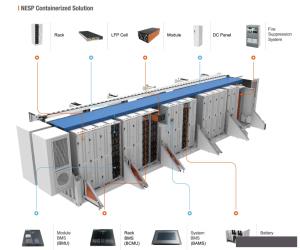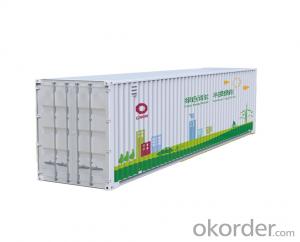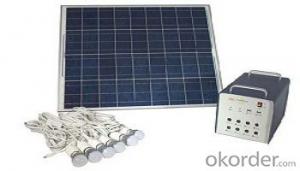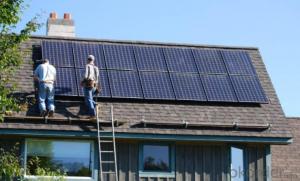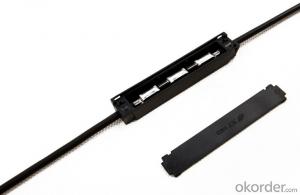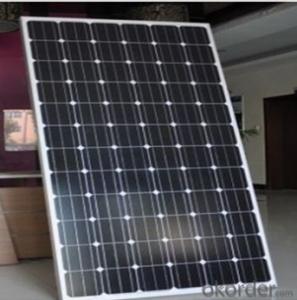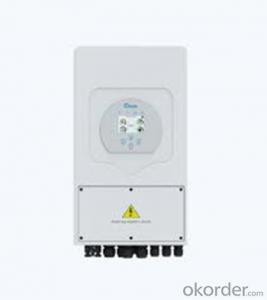1 Mwh Container Energy Storage System LiFePO4 battery for remote place ESS
- Loading Port:
- Shanghai
- Payment Terms:
- TT OR LC
- Min Order Qty:
- 1 unit
- Supply Capability:
- 50 unit/month
OKorder Service Pledge
OKorder Financial Service
You Might Also Like
Item specifice
Features:
1.LiFePO4 lithium battery
* Long-cyclelife (up to 2000 cycles)
* High specific energy
* High specific power,
* High energy conversion efficiency
* Easy installation
2.Intelligent battery management system(BMS)
* Precise voltage detection
* Precise current detection
* Precise temperature detection
* Precise SOC evaluation
* Battery protection
* Active balance
* Remote monitoring system interface
3.Unique Battery thermal management technology
According to aerodynamics and hydrodynamics theory, we has designed a unique thermal control system model for batteries. The model
has been extensively tested, by carrying out lots of temperature analysis experiments, to make sure optimization and uniformity
for each unit in the energy storage system is guaranteed.
Advantage:
First-class R&D team: Our R&D colleagues are from the TOP3 Lithium battery companies in China. we have very rich experience in lithium battery design, electronics, system testing and real application.
Strict Quality Control: We set a series strict QC standards include battery battery appearance, package, internal structure,charge / discharge performance, IP request etc. We strictly obey this standards to make sure every customers can get high quality battery from us.
Customer first culture: 80% of our customers are 5 years above close win-win cooperation partner. We treat our customers as our friends, family members. Every batteries we produced, sold are priceless trust from customers, so we cherish it and we keep a grateful, royalty and honesty heart to our customers.
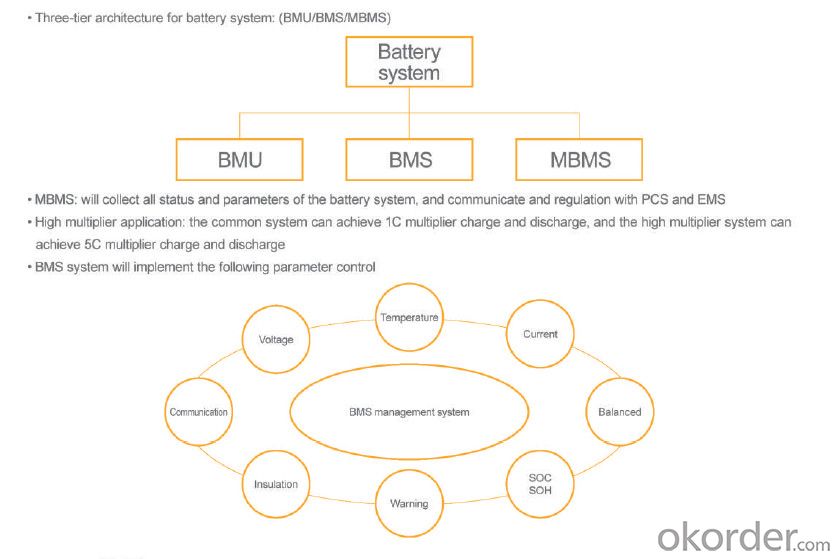
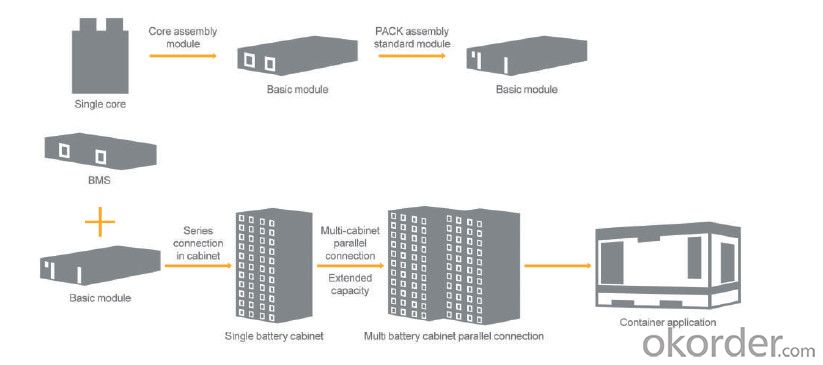
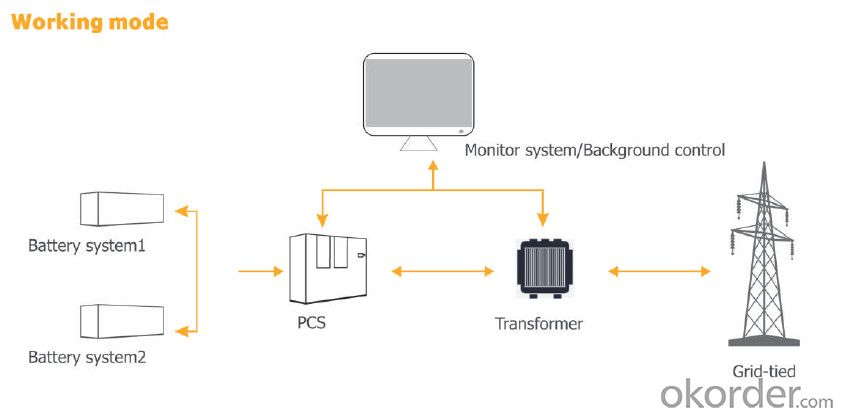

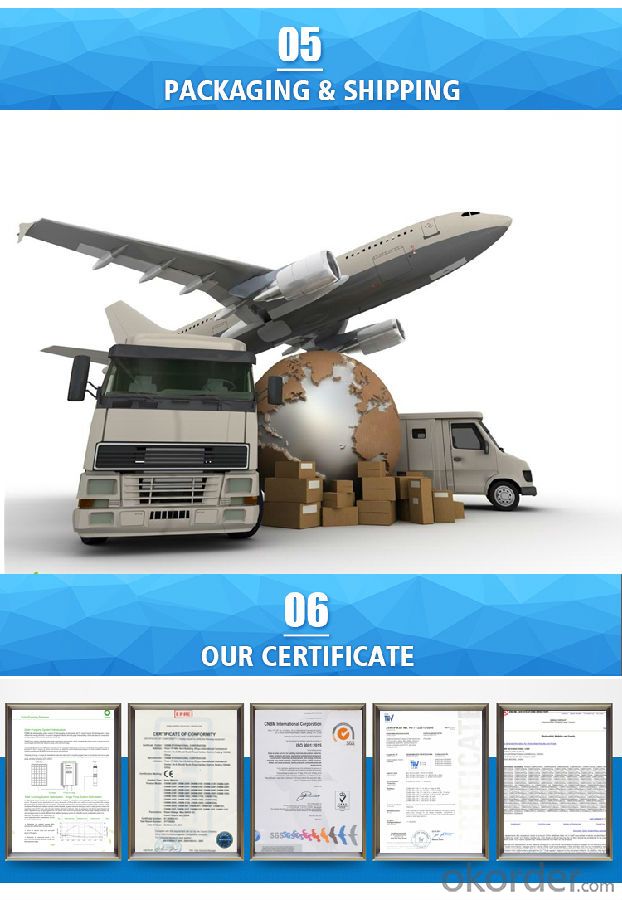
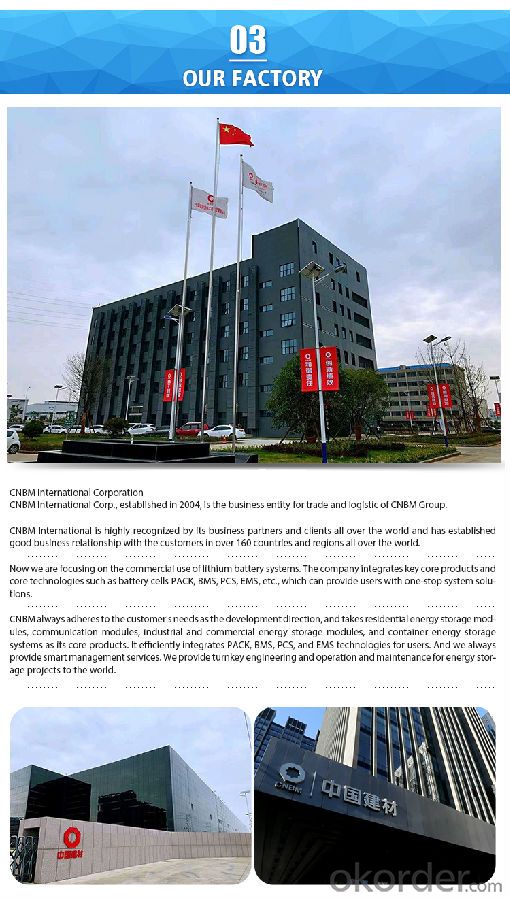
- Q:Can solar energy systems be used in areas with frequent hurricanes?
- Solar energy systems are indeed viable in areas prone to hurricanes. Despite the potential damage hurricanes can inflict on these systems, there are strategies to mitigate the associated risks. To begin with, it is possible to design and install solar energy systems in hurricane-prone regions in a manner that can withstand strong winds. This involves employing sturdier mounting systems, reinforced frames, and secure anchoring techniques. Additionally, optimizing the orientation and tilt angle of the solar panels can minimize wind resistance. Furthermore, regular maintenance and inspections are crucial for identifying any potential issues or damages before a hurricane strikes. This proactive approach allows for timely repairs or replacements, ensuring the system remains operational and secure during severe weather events. In the event of a hurricane, it is important to have emergency protocols in place to safeguard the solar panels and other components. Temporary removal of the panels and indoor storage or utilization of protective covers to shield them from debris are some viable options. Moreover, the use of microinverters or power optimizers can enhance the resilience of solar energy systems in hurricane-prone areas. These advanced technologies enable each solar panel to function independently, minimizing the impact of damage to a single panel and preventing the entire system from shutting down. Lastly, solar energy systems can contribute to the resilience of communities during and after hurricanes. By incorporating proper battery storage, these systems can provide backup power during power outages, ensuring the continuity of essential services and meeting critical electricity needs like lighting, refrigeration, and medical equipment. In conclusion, although precautions must be taken to ensure the durability and functionality of solar energy systems in hurricane-prone areas, they can effectively harness clean and renewable energy even in the face of frequent hurricanes.
- Q:Can solar energy systems be used in areas with high levels of saltwater exposure?
- Yes, solar energy systems can be used in areas with high levels of saltwater exposure. However, special considerations and precautions need to be taken to protect the solar panels and related equipment from the corrosive effects of saltwater. This can include using corrosion-resistant materials, regular cleaning and maintenance, and implementing protective measures such as barriers or enclosures.
- Q:Can solar energy systems be integrated into existing electrical systems?
- Yes, solar energy systems can be integrated into existing electrical systems. By installing solar panels on rooftops or other suitable locations, the generated electricity can be fed into the existing electrical system, reducing the reliance on traditional sources of electricity and potentially lowering energy costs. However, it is important to ensure the compatibility and capacity of the existing electrical infrastructure to handle the additional power supply from the solar energy system.
- Q:Can solar energy systems be used in powering traffic signals?
- Yes, solar energy systems can indeed be used to power traffic signals. Solar panels, also known as photovoltaic (PV) modules, can convert sunlight into electricity, which can then be used to power various devices, including traffic signals. This has several advantages over traditional grid-powered traffic signals. Firstly, solar-powered traffic signals are more environmentally friendly as they do not rely on fossil fuels or emit greenhouse gases during operation. This helps in reducing carbon footprint and combating climate change. Secondly, solar-powered traffic signals are independent of the electrical grid, making them more reliable during power outages or grid failures. They can continue to function even when there is a disruption in the main power supply, ensuring the smooth flow of traffic and maintaining safety on the roads. Furthermore, solar-powered traffic signals require minimal maintenance compared to their grid-powered counterparts. Once installed, solar panels have a long lifespan and only require occasional cleaning to ensure optimal performance. This reduces the need for frequent repairs and upkeep, resulting in cost savings for the traffic management authorities. Lastly, solar-powered traffic signals can be installed in remote or off-grid locations where it would be challenging or costly to extend the electrical grid. This makes them a viable solution for rural areas or areas with limited infrastructure. In conclusion, solar energy systems are an effective and sustainable solution for powering traffic signals. They offer numerous benefits such as environmental friendliness, reliability, low maintenance, and suitability for remote locations. With the advancement of solar technology, the use of solar-powered traffic signals is expected to increase, contributing to a greener and more efficient transportation system.
- Q:Can a solar energy system be installed on a boat or RV?
- Yes, a solar energy system can be installed on a boat or RV. In fact, it is becoming increasingly popular to use solar power as a sustainable and efficient source of energy for these types of mobile applications. Solar panels can be mounted on the roof or deck of a boat or RV to capture sunlight and convert it into usable electricity. This allows for greater energy independence and the ability to power various appliances, lighting, and charging devices while on the go.
- Q:Can solar energy systems be used in areas with high seismic activity?
- Yes, solar energy systems can be used in areas with high seismic activity. However, it is essential to design and install these systems with seismic-resistant features in mind to ensure their structural integrity during earthquakes. Reinforcing the mounting structures, using flexible connectors, and implementing proper anchoring techniques can help mitigate potential risks. Additionally, regular inspections and maintenance are crucial to ensure the ongoing safety and functionality of solar energy systems in seismic-prone regions.
- Q:Are there any risks of theft or vandalism with solar energy systems?
- Solar energy systems do come with some risks of theft or vandalism. Valuable solar panels and equipment used in these systems can attract thieves who may try to sell them on the black market. Moreover, since solar energy systems are usually installed in remote or isolated areas, they are more susceptible to theft as they may not be easily monitored. Vandalism is also a concern as solar panels can be intentionally damaged or destroyed by individuals with a grudge against the owner or simply for the sake of causing damage. This can result in financial loss and disruption of energy production. To mitigate these risks, homeowners and businesses can take various precautions. Installing security measures like surveillance cameras, motion sensors, or alarms can deter theft or vandalism. Placing panels in visible and easily accessible locations can also make them less appealing to potential thieves. Additionally, marking the panels with unique identifiers can make it harder for thieves to sell them. Insurance coverage is another crucial consideration to safeguard against theft or vandalism. Many insurance companies offer specialized policies that cover solar energy systems, providing compensation in case of theft or damage. In summary, although there are risks of theft or vandalism associated with solar energy systems, these risks can be minimized through preventive measures and insurance coverage. It is important for owners of solar energy systems to be aware of these risks and take appropriate steps to safeguard their investment.
- Q:What are the benefits of installing a solar energy system?
- Installing a solar energy system comes with numerous benefits that make it a compelling choice for individuals, businesses, and communities. First and foremost, solar energy is a renewable and sustainable source of power. Unlike fossil fuels, which are finite and contribute to environmental degradation, solar energy harnesses the power of the sun, which will continue to shine for billions of years. One of the key advantages of solar energy is its ability to reduce electricity bills. By generating your own electricity, you can significantly lower or even eliminate your reliance on grid power, resulting in substantial savings over time. Moreover, solar panels have a long lifespan, typically lasting 25 to 30 years, meaning you can enjoy these cost savings for decades. Not only does solar energy save money, but it also provides a stable and predictable energy cost. As utility prices fluctuate due to various factors, solar energy allows you to lock in your electricity costs and protect yourself from future price increases. This stability can be particularly beneficial for businesses and organizations that need to manage their budgets effectively. Installing a solar energy system also helps to reduce carbon emissions and combat climate change. Solar power is a clean and green energy source that produces no greenhouse gases or air pollutants during operation. By transitioning to solar energy, you can decrease your carbon footprint and contribute to a cleaner and healthier environment for future generations. Furthermore, solar energy systems require minimal maintenance. Once installed, solar panels generally require only occasional cleaning and inspections, making them a hassle-free and low-maintenance energy solution. They also provide energy independence, allowing you to generate your own power and become less reliant on external energy sources. In addition to these benefits, installing solar energy systems can also lead to job creation and economic growth. The solar industry has been rapidly expanding, creating new employment opportunities and contributing to local economies. Investing in solar energy not only benefits the environment but also stimulates economic development and supports the growth of a sustainable and resilient energy sector. Overall, the benefits of installing a solar energy system are vast and multi-faceted. From cost savings and energy independence to environmental sustainability and job creation, solar power offers a compelling solution for a brighter and more sustainable future.
- Q:What is the impact of fire on solar panels?
- Solar panels can suffer significant and detrimental effects from fires. These fires can directly damage the panels, resulting in complete destruction or rendering them inoperable. The high temperatures generated by fires can cause delicate components, such as the photovoltaic cells and wiring, to melt or warp. This damage can render the panels incapable of producing electricity. Moreover, fires produce smoke and soot that can cover the surface of solar panels, obstructing sunlight and reducing their efficiency. This diminishes the amount of light they can absorb, resulting in a significant decrease in power output. In addition to physical damage, fires pose a safety risk to the surrounding area. Since solar panels are often installed on rooftops or in open areas, they are vulnerable to fire hazards. If a fire occurs near or on a solar panel, it increases the risk of spreading and causing further property damage. To minimize the impact of fires on solar panels, it is crucial to implement proper fire safety measures. This includes using fire-resistant materials for installation and ensuring adequate protection from potential fire sources. Regular maintenance and cleaning are also necessary to remove debris and soot, maximizing efficiency and reducing the risk of damage during a fire. Overall, fires can have severe consequences for solar panels, including physical damage, reduced efficiency, and safety risks. Taking necessary precautions and implementing fire safety measures are essential to protect solar panels and minimize potential losses.
- Q:Can a solar energy system be used for charging electric vehicles?
- Yes, a solar energy system can be used for charging electric vehicles. Solar panels can generate electricity from sunlight, which can then be used to charge the batteries of electric vehicles. This provides a sustainable and renewable source of energy for electric vehicle charging.
1. Manufacturer Overview |
|
|---|---|
| Location | |
| Year Established | |
| Annual Output Value | |
| Main Markets | |
| Company Certifications | |
2. Manufacturer Certificates |
|
|---|---|
| a) Certification Name | |
| Range | |
| Reference | |
| Validity Period | |
3. Manufacturer Capability |
|
|---|---|
| a)Trade Capacity | |
| Nearest Port | |
| Export Percentage | |
| No.of Employees in Trade Department | |
| Language Spoken: | |
| b)Factory Information | |
| Factory Size: | |
| No. of Production Lines | |
| Contract Manufacturing | |
| Product Price Range | |
Send your message to us
1 Mwh Container Energy Storage System LiFePO4 battery for remote place ESS
- Loading Port:
- Shanghai
- Payment Terms:
- TT OR LC
- Min Order Qty:
- 1 unit
- Supply Capability:
- 50 unit/month
OKorder Service Pledge
OKorder Financial Service
Similar products
New products
Hot products
Hot Searches
Related keywords
